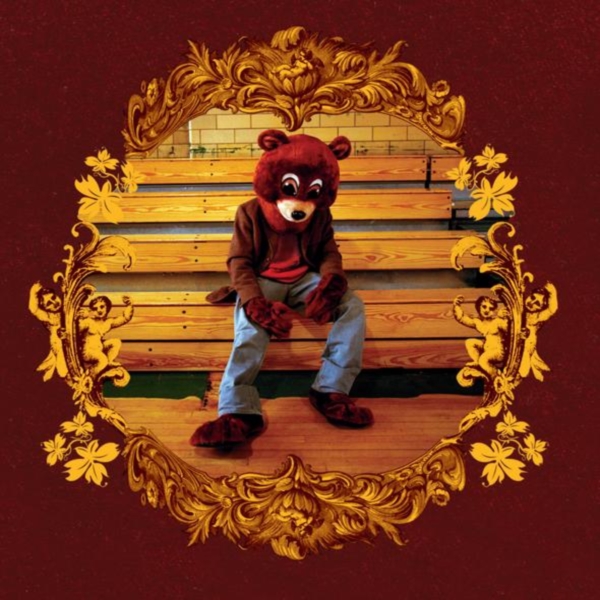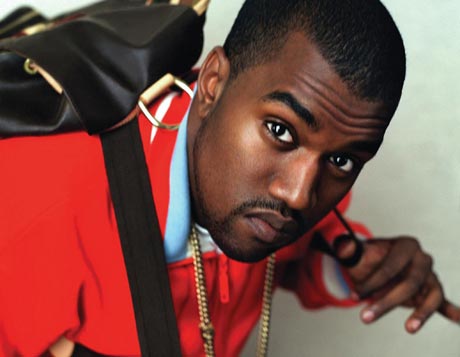I’d like to be able to recount a touching and vivid tale of how I first heard Kanye West’s The College Dropout when it was released in 2004, but I can’t. I remember the little details of purchasing Late Registration: an impromptu car ride to Best Buy with my mother, excitedly tearing open the jewel case, the memorable “Wake up, Mr. West!” intro. I remember getting off from my overnight job at 10am and taking a cab to the same Best Buy to buy Graduation (and 50 Cent’s Curtis) the day it dropped, needling the cashiers as to who seemed to be winning the album sales war. I half remember downing a fifth of Aristocrat vodka and downloading an unfinished leak of 808s & Heartbreak, astonished that something so indulgent and retro could affect me so deeply. I can chart my life to Kanye’s career, graphing a painterly parabola of artistic inspiration and nourishment.
That said, actually acquiring his debut is a bit of a blur. I knew who Kanye West was because I was a nascent backpacker in high school. I grew up on grunge and alt-rock radio, arriving to hip hop late, somewhere in middle school. Playing a game of racial credibility catch-up wasn’t easy, but The Roots and Talib Kweli were there to help. Slurpee-stained back issues of Scratch magazine introduced me to the Louis Vitton Don, a curiously arrogant beatmaker who would shout from any nearby rooftop how he was going to be the biggest rapper alive. The magazine interviews and MTV News bits about his mythic car crash stuck in my head and probably served as motivation enough to shell out $14 for a CD. I may not recall the particulars of the purchase, or any standout moments from that initial listening session, but it’s impact on my life, and the pop music landscape, are irrefutable.
I’ve written before about what Kanye meant for a geek like me at that age. He was a musical Muad’Dib, bridging the gap between people who listened to Cam’ron and people who listened to Pharoah Monche. It’s comical to think of how revolutionary it was to have Freeway and Mos Def on “Two Words” together, given how much cross pollination takes place between the differing hemispheres of modern day Hip Hop. For me, I was able to find an artist who spoke to me on a natural level. Common was too conscious and Jay-Z lived a life I was incapable of even fantasizing about back then. Kanye West may not have been the first “regular rap dude” but he was the first one that I personally grafted onto, and I’m sure that was the case for a lot of other listeners at the time as well, as evidenced by the current radio landscape.
It being the ten year anniversary, I’ve been revisiting the album a lot this week, and it’s been enlightening. Of Kanye’s discography, his first album is the one I go back to the least, more because of personal preference than any perceived deficiency in the LP’s quality. When people complain to me about missing the “old” Kanye, I tend to roll my eyes and continue fantasizing about owning Maison Margiela-designed, diamond encrusted luchadore masks, so you can call me a stan if you like. I just never had much reason to listen to it from front to back, despite my regular ritual of shuffling Kanye’s entire discography on long train rides.
Going back to where it all began, with DeRay Davis’ pitch perfect Bernie Mac impersonation, the first of the album’s many humorous, thematically appropriate skits, was a blast, honestly. All told, the album is brilliantly paced and sequenced, its 21 tracks bifurcated into easily identifiable chapters. Opening tracks “We Don’t Care” and “All Falls Down” paint a picture of modern Black life, the contradictions and complications that weave a tapestry with as many different threads as there are African Americans alive. The relatable punchlines and carefully curated details of Black life strewn about Kanye’s rhymes connecting with every corner of the culture, striking a balance between a startling specificity and a broad appeal. The familiar complexity reminded me so strongly of my own family, and that of my friends. This motif followed into interlude “I’ll Fly Away,” a sullen daydream that called to mind the browbeaten sun. It didn’t do a lot for me in high school, but when I dropped out senior year to manage a video store, its follow up “Spaceship” became my personal soundtrack. Having grown up during the Jiggy era, finding a rap song that so nakedly struggled with the mundane tragedy of minimum wage cashier work was eye opening for me.
From there, he shifts his focus from one touchstone of rap to another, from “Spaceship”‘s blue collar rhymes to the soulful, gospel-inflected passion of “Jesus Walks” and the Jay-Z assisted “Never Let Me Down.” It’s impossible to overstate the power of “Jesus Walks.” I can’t count the number of spins I’ve personally given this song in the last decade, but it never loses even a shred of its transformative power. The thunderous instrumental, the defiant hook, and the colorful details (like the vocal gasps in the first verse) conspire to bowl you over every time you deign to press play. This praise is coming from a dedicated agnostic. When Kanye played this live during his Yeezus tour, its blistering three minutes and thirteen seconds transmuted the arena’s walls to stained glass. It was an undeniable display of pop music prowess that bestowed Kanye with a palpable heft that continues to keep him afloat in the minds of his many doubters. As he himself has said, “I made ‘Jesus Walks,’ I’m never going to hell.” “Never Let Me Down” makes for a really fun contrast with later Hova collaborations, like The Throne’s “Murder To Excellence.” I’ll never forget playing this song around my grandmother, who had a strong distaste for much of rap’s vulgarity but was reduced to waving arms and emotional exhalations at J.Ivy’s potent spoken word outro.
The album’s middle act is a very interesting redux of what was generally expected of mainstream hip-hop at the time. Songs about hooking up and smoking weed (“Get ‘Em High,”) absurd braggadocio (“Breathe In, Breathe Out,”) and womanizing (“New Workout Plan” and “Slow Jamz”) hit the necessary marks for anthemic club-readiness, but with a twist. It was as if Lars Von Trier had challenged a young Kanye to a Five Obstructions style deconstruction of Hot 100 rap music. “New Workout Plan” in particular, as ridiculous as it remains, succeeds solely on Kanye’s unique charm, some very ambitious execution, and a surprisingly sound concept. It functions as this particular audio set piece’s climax, naturally blending into “Slow Jamz,” as much an ode to the music that inspired Kanye as it is to his skill for showcasing talent. Jamie Foxx and Twista only ever matched their performances here on “Gold Digger” and “Overnight Celebrity” respectively, each obviously reconnecting them with Mr. West.
Having said what was necessary about Black culture, the struggle, and the pop side of the hip hop equator, the album’s final third, albeit overrun by a victory lap of excessive skits, goes for the title belt. The aforementioned “Two Words” is exciting verbal sparring riding a wave of stabbing, dramatic strings, and the edited-on-purpose “School Spirit” is a prime slice of what many picture when they imagine “timeless” Kanye, the Black Moon influenced charmer they fell in love with on the Freshmen Adjustment mixtapes. The clever asides, questionable gags and soul sampling boom bap that birthed so many sons. Roc Nation artist J. Cole’s entire existence in the rap landscape is a monument to early Kanye track “Apologize” and it’s at this point on the album that Kanye begins to wrap a bow around this late Christmas gift. The gleeful and triumphant myth making of “Through The Wire” is still so much fun to this day. I know other, tougher rappers get to brag about surviving gunshot wounds, but I always enjoyed that my favorite rapper survived a car crash so he could make puns about Tom Cruise.
I still don’t like “Family Business.” I’ve honestly been skipping this track since my teen years, probably because it’s ground Kanye covered much more soundly on Late Registration‘s “Roses.” The sprawling, reflective touchdown dance of “Last Call,” equal parts “Ma, I made it” and microcosm biopic, is one of my favorite album finales ever. So many of Kanye’s progeny adopted this sort of documentary vignette storytelling to their repertoire, proving that the limelight shines that much brighter when contrasted with the long, dark road that got them there. I usually like to throw “Last Call” on just for the line “Nice as Bun B when I met him at the Source Awards / Girl he had with him? Ass could have won the horse awards” but I almost always end up letting the entire “making of” outro rock. It’s particularly fun now to hear Kanye recount the countless doors slammed in his face in his youth, considering the Couture War he’s been waging of late.
When I was in my early twenties, miserable from working fourteen hour nights at a job I hated and writing shitty plays on no sleep that no one would ever produce, Kanye’s music kept me going. Knowing that this goofy, pink Polo wearing mufti-hyphenate was able to prove people wrong and cement himself at the heart of popular culture gave me a great deal of hope. Ten years on, the grind continues, but Kanye’s had five albums since then, each one grander and more experimental than the last. Going back to where it all began, listening to this man tell you who he’s going to be, knowing now that time has proven him right? It’s exhilarating.
Maybe ten years from now, we’ll be talking about DONDA’s education reform and Kanye’s school uniforms. Maybe not.
Either way, “Jesus Walks” will still go, and this album will still be a classic.






Wow absolutely amazing article. I’ve never related to an article so much before. Kanye will definately go down in history as a leader of a cultural revolution. I also love how you mentioned J. Cole as well.